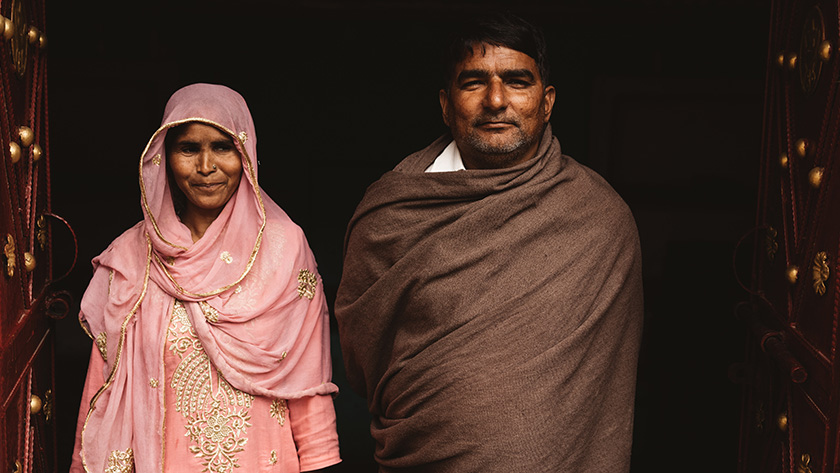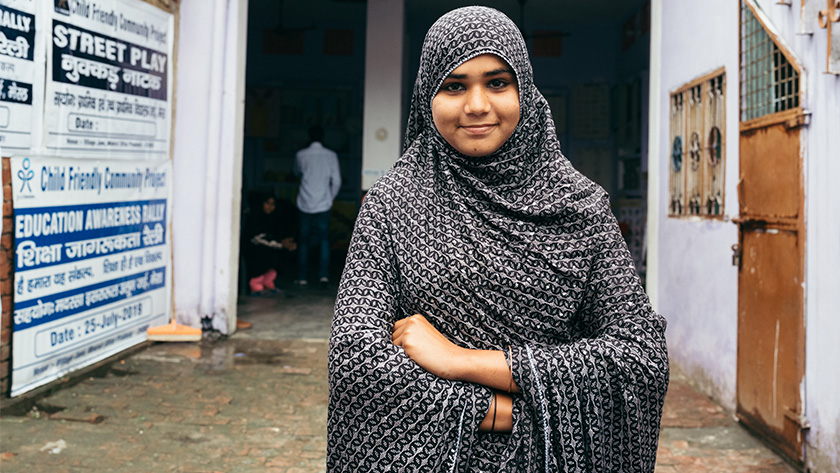With demand for toilet paper and other household items in the headlines, the COVID-19 crisis has made supply chains news, highlighting what disruptions mean to consumers, companies, and workers. This story of a little girl and her village calls attention to the world’s largest labor force—informal workers. Their exploitation, namely child, forced and bonded labor, drives intergenerational poverty.
The home-based workers in Meerut, Uttar Pradesh in northern India possess special skills in beading and handwork. These embellishments turn ordinary products into something special to consumers. Yet the brands that profit from these artisans do not know they exist, nor that their children work alongside them for penny wages. Consumers, too, don’t understand the connection between the things they buy and the individuals who made them. Now, since the COVID-19 lockdown, the home-based workers in this Meerut community are completely without income. Customers aren’t buying beaded jewelry and garments. Orders have stopped, while finished products sit in warehouses across India, Europe, and the United States.
GoodWeave operates child labor prevention programs in Meerut. During a surprise inspection, we found 12-year-old Muskaan outside her home, making bracelets alongside her mother Afsana. Her only schooling was one hour of daily Quran study at a local Madrasa (Muslim school). Afsana was keen to send Muskaan to formal school to learn English, Hindi, and math, which would make her the first literate member of her family. Muskaan’s father Shahir was against the idea.

So, our community-based facilitators worked with the Madrasa to expand their curriculum, and with convincing from her mother, Shahir agreed to send her to all-day school. In five months, Muskaan has advanced rapidly towards her age-appropriate learning level.
Before COVID-19, Muskan’s village was taking strides to safeguard against child labor. After three-years enrollment rates for previously out-of-school children reached 69 percent and children were in school and not working.
Practically overnight, everything changed and GoodWeave’s grassroots network around the country became the lifeline for many producer communities. We never imagined that our access to informal and marginalized workers would be used to simply keep people alive, but post-COVID-19, Muskaan’s family could starve without the rice, lentils, and oil that we give them. We remain in contact with every household in her community, to determine their eligibility for government food subsidies to “Ration” cardholders, and cash benefits for those with Jan Dhan bank accounts set up with support of the Indian government to increase financial inclusion and access to affordable credit.
Several workers have qualified, among them Muskaan’s father. However, migrant workers across Uttar Pradesh, Haryana, Bihar, and West Bengal, are ineligible for aid because they are not in their home villages while bus and train service has stopped. In desperation, some are walking home. says, “The new coronavirus has given migrants a sudden visibility in the national discourse,” writes journalist Patralekha Chatterjee in The Atlantic. “But the acuteness of their plight today is a result of the fact that India ignored them during normal times.”
GoodWeave serves some 140,000 workers and their families across India, Nepal, and Afghanistan. In Nepal, the majority of informal carpet industry workers are trapped away from their villages in company housing, comprised of small rooms with cooking burners. Facing food and gas shortages, one of our staff fears “workers would die of hunger before Coronavirus.” We estimate less than 10 percent of migrant workers have left the Kathmandu Valley. Government aid has been sporadic at best.
I met Muskaan just days before the international travel bans. I was in Meerut to prep for a film shoot. It was dusty and flies clustered around the open sewers. We were welcomed in the Madrasa courtyard by a group of women, led by the school principal. It was a sweet, loving environment. Muskaan gave me a quick tour of her school, and then we walked to her house.

In this global economy we all benefit from the hard work of strangers, possibly, Muskaan or her mother, whose hands never stopped beading while she chatted with us. GoodWeave helps companies see their supply chains, which inevitably extend beyond factory walls down to homes. There are many layers, from communities like Muskaan’s, to the brokers who bring them piece work, sub-contracted units and dedicated centers, the export manufacturers who consolidate orders for international brands, and the retailers and consumers. Together, these actors have direct impact on the world’s 152 million child laborers.
So far, there are no reported COVID-19 cases in Muskaan’s community. To leave, one must obtain government permission, and outsiders are not allowed in. When consumers return to stores, companies will again place orders and jobs will trickle back. Production is slowly ramping back up in other rural areas of India. The government has reopened “green” zones like Bhadohi. In Panipat, 56 out of 400 GoodWeave-inspected factories and units have permission to restart and 17 more may receive it within a week. We estimate 40 percent of suppliers could be operating in about a month.
The longer it takes, the lower income will be for informal workers. Who would be bold enough to ask for a living wage when they are desperate for any work? Families will struggle to feed themselves, and education—the best child labor prevention there is—will be their last priority.
While threatening the survival of companies around the world, this crisis offers opportunity to rebuild a market that cares about people. What does the future hold for Muskaan’s community? This is the conversation we need to have. There are hopeful signs. Recognizing that economic upheaval increases child labor risk, the EU just announced that they will advance a mandatory due diligence law. This could support a worker-centered, economic model, and potentially help override harmful market actions. At odds with this legislation, several Indian states are relaxing labor laws, which Radhicka Kapoor of ICRIER characterized as “creating an enabling environment for exploitation.” What we need now is an increased effort to reach and ensure rights for the hidden, exploited workers.
Before I said “goodbye” to Muskaan during that March visit, I asked her who she imagined wore the little bracelets she had created. “Movie stars,” she replied with pride. GoodWeave is launching a new “Tell Them I Made It” campaign for World Day Against Child Labor on June 12, which embraces what workers say (including Muskaan’s own mother), when we ask them if they have a message for the person who buys the rug they wove or the tunic they stitched. The goal is to remind everyone that we are indeed connected to the people that make the products we use every day.
Learn more about GoodWeave, it’s COVID-19 Child and Worker Protection Fund and virtual event on June 10th about the impact of COVID-19 on child labor at goodweave.org.
Want more stories of transformational change on the world’s most pressing problems? Sign up for Skoll Foundation’s monthly newsletter.